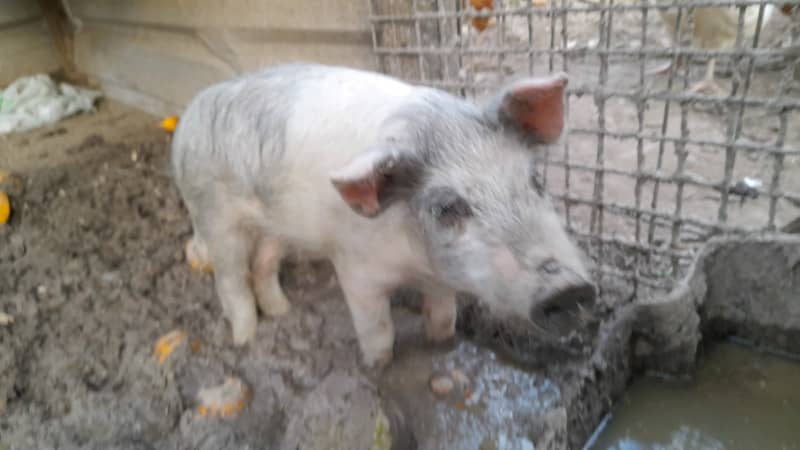
A pig standing in food waste. Source – Gumtree.
AGRICULTURE Victoria has disclosed compliance action against four waste food outlets for supplying illegal food waste to pigs, as an urgent recall continues for pork floss product from China sold in Melbourne containing Foot and Mouth Disease viral particles.
A Sheep Central investigation has also uncovered recent online photographic evidence of pigs being fed food scraps, gaps in national pig ownership and traceability data and industry concern about auditing activities.
Some backyard pig producers, especially those publishing photographs of pigs being fed food waste, displayed a lack of awareness of PigPass and the dangers of feeding swill. One producer told Sheep Central he only fed the food waste to bring the pigs in and another said he had sold the pigs “so I probably don’t need to worry about it.”
The Victorian food outlet compliance disclosure comes after the pork floss discovery and other cases of FMD particles in illegally imported meat via airports has already heightened government and industry concern around the risk of an FMD outbreak via swill feeding of pigs.
Inquiry needed into food import procedures and waste feeding
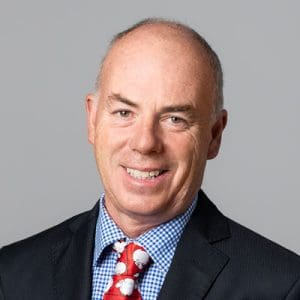
VFF Livestock Council president Steve Harrison.
The series of FMD-related revelations has prompted Victorian Farmers Federation Livestock president Steve Harrison to call for an inquiry into swill feeding, and how the pork floss with FMD fragments was imported for retail sale and pig producers were able to acquire illegal food waste.
“This demonstrates how our biosecurity just isn’t up to scratch.
“Everyone has to be involved in this from the top to the bottom to take responsibility and do the right thing,” he said.
“If they are feeding products that shouldn’t be allowed (to be fed), someone’s heads got to roll, that’s just rubbish.
“There should be an inquiry.”
Agriculture Victoria audits 37 waste food outlets in two years
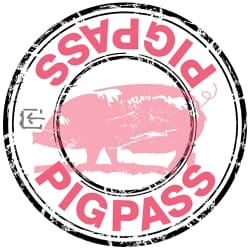 Agriculture Victoria said it is illegal to swill feed pigs, which involved feeding pigs food scraps or food waste that contains meat, or has come into contact with meat, to pigs.
Agriculture Victoria said it is illegal to swill feed pigs, which involved feeding pigs food scraps or food waste that contains meat, or has come into contact with meat, to pigs.
Over the past two years, 37 waste food outlets in Victoria have been audited after being reported by environmental health officers, members of the public or detected during on farm audits as suppliers to pig producers.
“Four waste food outlets were issued compliance outcomes for supplying illegal food waste to pig producers,” an Agriculture Victoria spokesperson said.
Victorian Chief Veterinary Officer Graeme Cooke was unavailable today to answer further questions about the compliance action.
Agriculture Victoria’s livestock traceability manager Ben Fahy said all pig owners in Victoria are required to have a property identification code identifying the property where pigs are kept and they should register with PigPass, the national tracking system which provides real time information on the movements of all pigs in Australia.
“Property identification codes and PigPass are critical for tracing and controlling disease and residue problems that may be detected and for locating properties and contacting owners and industry representatives during an emergency.”
However, Peter Haydon executive manager of operations for Australian Pork Ltd, which monitors PigPass compliance said not all pig owners are registered with the system. The Australian Bureau of Statistics has been unable to tell Sheep Central how many pig producers the nation has.
The United Kingdom’s FMD outbreak in 2001 reportedly began in pigs fed food waste, with live virus most likely spread via an airborne plume to sheep and cattle five kilometres away and then through the saleyard system across the country.
No cross-checking of non-PIC pig-owning restaurant owners
Agriculture Victoria said there is no specific cross-checking of restaurant owners who also own pigs, but every new pig owner applying for a PIC is contacted so they understand the important reasons why it is illegal to feed swill to pigs.
“This would cover any restaurant owners with PICs for pigs.”
AV also audits pig properties where producers collect and feed out waste food products and are at risk of swill feeding. Council environmental health officer target licensed food premises that have the potential to provide prohibited pig feed to producers, providing education and reporting issues to Agriculture Victoria.
“Producers who collect and feed waste food products are detected through auditing undertaken on every new pig PIC/tattoo owners, reports from other regulators, industry and the public, and through random waste food outlet audits.”
No live virus in pork product, but don’t feed to animals
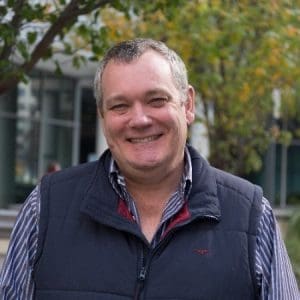
Dr Chris Parker. Image – LinkedIn.
Heat treatment at high temperatures can kill FMD virus in meat products, but federal and Victorian authorities have refused to confirm whether it has been established whether the imported pork floss product was sufficiently heat-treated to kill all live FMD virus.
They will also not quantify the level of FMD risk any unreturned pork floss product poses, nor whether they consider there is any risk of viable FMD virus in the product. Sheep Central has been refused an interview with Chief Veterinary officer Dr Mark Schipp to answer these and other questions.
Hiding behind the statement that it cannot comment on an ongoing investigation, DAFF has also refused to state how long the pork floss product was on sale, how it got into the country or whether shipments were made into other states.
DAFF’s initial media release said the pork floss product was processed, “but investigations have not found evidence that the treatment was to Australia’s requirements.” In an industry webinar on FMD on 20 July, Minister for Agriculture Murray Watt said that it isn’t clear that the products had been imported appropriately and the biggest risk Australia faces is from FMD coming in via animal products.
Head of DAFF’s National Animal Disease Taskforce Dr Chris Parker reiterated this and said “in an abundance of caution we removed them from the shelves and I think that’s prudent action and I think that is action that is appropriate to the risk in the current situation.”
“It’s the system working and we feel confident that if there has been any activity that would indicate these products have not been legally imported — and I’m not saying there is, because that would be pre-empting the investigation – you can be guaranteed that we have a full suite of penalties that can be applied and we look to apply those diligently as you would expect.”
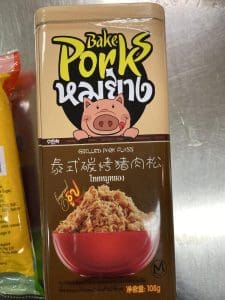
The recalled pork floss product. Image – DAFF.
Australian Chief Veterinary Officer Dr Mark Schipp last week told Victorian Country Hour the pork products with the FMD fragments were from countries that (Australia doesn’t allow meat imports from) and had been described as (being of) vegetable origin, but were of animal origin.
“It doesn’t necessarily mean that there’s infectious virus or that the virus has survived the food processing processes,” Dr Schipp said.
Minister Watt reportedly told the ABC last week:
“What has been found is viral fragments, which are almost certainly dead,” he said.
“They’re not live virus and it doesn’t mean that we’ve got foot-and-mouth disease in the country at the moment.”
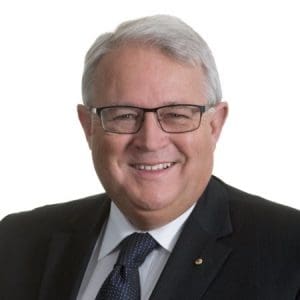
DAFF secretary and director of biosecurity Andrew Metcalfe.
In a Linkedin post on July 20, DAFF secretary and director of biosecurity Andrew Metcalfe reiterated the “urgent recall” of Bake Pork’s grilled pork floss sold at Asian food retail outlets across Victoria, stating: “Do not feed or expose this product to livestock or other animals under any circumstances.”
DAFF has refused to quantify the level of FMD risk that Mr Metcalfe’s comments indicate might exist with feeding or exposing the pork floss product to animals, except for a departmental spokesperson stating:
“Out of abundance of caution and given the lack of documentation on the product this pork floss has been removed from the shelves, and the import path is being investigated.
“Pig owners must not feed meat, animal products or imported dairy goods to their pigs. Swill feeding is illegal in Australia.”
Last week a departmental spokesperson told Sheep Central the department cannot comment on an active investigation.
“The test does not indicate live virus but viral fragments.
“Proper heat treating destroys the virus, but would not destroy the fragments,” the spokesperson said.
“Viral fragments cannot infect pigs, and swill feeding is illegal in Australia.”
The risk in not quantifying risk consistently

Peter Sandman. Picture – NSW Minerals Council.
World risk communication expert Peter Sandman said officials often have two competing messaging goals vis-à-vis a risk: “to persuade the people whose actions might exacerbate the risk that it’s serious enough to take specified precautions; and to persuade everybody else that it’s not serious enough to worry.”
“The double message risks undermining trust in both audiences: The first audience doesn’t believe the risk is serious and shrugs off the recommended precautions, while everybody else recognizes the false reassurance as facile, overstated, and unpersuasive.”
He said it is better to tell both audiences the same thing: “We think it’s unlikely that X [FMD infecting the animal population] will happen.
“But it’s not impossible, and if it did happen the results would be awful,” Mr Sandman said.
“So for an extra margin of safety, it’s really important for A and B [farmers] to take the following precautions…. Even though these precautions are probably unnecessary, they just might save us from those awful outcomes.
“It’s tempting to say there’s no reason to worry, and that’s probably true,” he said.
“But we want A and B [farmers] to take this risk seriously.
“We need them to worry, even though nobody else has to,” he said.
“If we get any evidence that the situation is worse than we think, or better than we think, we’ll let you know.”
Mr Harrison said producers and the community should quantify the swill feeding risk posed by the pork floss product.
“They should, because they would make people aware of what not to do.
“It’s a no-brainer, we’ve got to get it out there to make people more aware of what not to do, to prevent people from swill-feeding pics or any animal,” he said.
On whether authorities were now dumbing down their messaging since some metropolitan media incorrectly reported that the FMD fragments in the pork floss represented Foot and Mouth Disease, Mr Harrison said he would rather they were “over-cautious than asleep at the wheel.”
He said producers and the public need clearer information on the swill feeding risk posed by the pork floss product.
No DAFF admission of an updated FMD outbreak risk judgement
In the FMD webinar on 20 July, Dr Chris Parker also said that in March this year, “boffins” made “a structured expert judgement” that there was an estimated 9pc likelihood of an FMD outbreak here within five years. He said this likelihood estimate was increased to nearly 12pc in June, before FMD was report in Bali.
Dr Parker said the estimates are not absolute figures, but do show that the risk increases and were why Australia had a national plan and was putting in place the extra border measures.
However, despite Dr Parker’s assessment of an increasing outbreak risk, the subsequent Bali outbreak and the pork floss FMD fragments discovery this month, the department today would not say whether there had been an updated FMD outbreak risk judgement since June, when the likelihood was estimated at 11.6 percent (up from 9pc in March) in the next five years.
“The 2022 ‘structured expert judgement’ (SEJ) exercise about the probability of a FMD outbreak in Australia in the next five years was conducted before reports of FMD in Bali.
“However, the likelihood of ongoing spread in Indonesia, and the region more broadly – as well as factors such as tourism to Bali – were considered by participants as part of that exercise,” the department spokesperson said.
“Likewise, participants considered factors that were supporting Australia’s ongoing freedom from FMD – including that awareness and biosecurity measures had been evolving.
“It is important to note that the exercise was not based on modelling.”
‘Entirely possible’ swill feeding is occurring
Australian Pork Ltd executive general manager – operations, Peter Haydon, said it is entirely possible that swill feeding is going on in Australia.
“It’s really hard to know what you don’t know.”
Mr Haydon said there were 3900 producer properties registered on PigPass, the national tracking system which provides real time information on the movements of all pigs in Australia.
He said Australian Pork monitored the number of PigPass National Vendor Declarations are closed within 48 hours, with a year-to-date figure of 97.4pc.
“Our coverage in terms of pigs is actually pretty good.
“I checked last week (up to 15 July) and of the slaughters reported by abattoirs and had a PigPass NVD closed of 96.8pc.”
Mr Haydon said not all pig producers are registered with PigPass.
“I couldn’t believe that for a million years.”
He said fortunately for the industry the vast majority of pigs are owned by a very small number of producers, with just over 200 producers owning more than 90 percent of the pigs.
Mr Haydon said it is a concern that there are pig producers without Property Identification Codes moving pigs without registering this on PigPass.
“If biosecurity is as important as it is to the pig industry, anything less than 100 percent is going to be a cause for concern.
“You very rarely get to 100pc, but that doesn’t mean it’s not a cause for concern.”
Mr Haydon said there needs to be more resources applied to regulating cases of swill feeding as those indicated in recent online sale website.
“There is clearly a vector which is a worry, which is any pig that’s not registered, or any sheep or cattle that are not registered, that moves illegally, that’s always going to be a concern.”
Mr Haydon said he didn’t believe the authorities could know whether they have found all the pork floss product brought into Melbourne for sale.
“Having worked in food companies before working in agriculture, even when you do a recall, you don’t get all of it back.”
Mr Haydon said despite several cases of inert FMD and Australian Swine Fever viral fragments being discovered, Australia retained its FMD and ASF-free status “because there is no sign of the live virus.”
He said his concern with the pork floss product is that DAFF had said there wasn’t evidence that it was treated as it was supposed to be treated.
“That’s the concern because all of our biosecurity laws are based on science, so within the department’s risk assessment, so long as you behave in the way they say Australians should be safe.”
Mr Haydon said Australia has made good progress with its biosecurity, but was still “not perfect yet”.
“I think if there was any obvious next step that would get you from a good position to a perfect position would take it … I think it is likely to be a number of different initiatives.”
He indicated it would be more realistic to aim for targets that can be measured.
“’A’- you measure it and ‘B’ – you aim to improve.”
He said APL can measure how many pig that have been slaughtered with how many are moved within the PigPass system, and also measured the number of NVD that are closed on time.
“There are still things you would like to measure and like you say, you don’t know how many pigs, sheep or cattle are killed outside abattoirs…
“Those ones are not in an abattoirs and are probably not on an NVD, so you can’t track those either way,” he said.
He said if the slaughter figures and PigPass movements don’t match exactly, APL did not check with abattoirs every week.
“But we can check if there is a big discrepancy.
“At the moment what we are trying to do is try to triangulate and say if this and this true then that’s probably safe, whereas if there is an inconsistency, let’s go and investigate it.”
Mr Haydon said commercial pig owners know not to swill feed and the risks for their business, and most don’t let pork products into their canteens or on the premises.
He said serious farmers who aren’t serious pig farmers are also aware of the importance of biosecurity.
“It’s really trying to get to those people who do a tree change and have pig, but they are actually town people, not farmers.
“They just don’t know what they don’t know, but trying to regulate that you would end up paying so much in tax.”
State jurisdictions ‘don’t have the money’ – De Souza
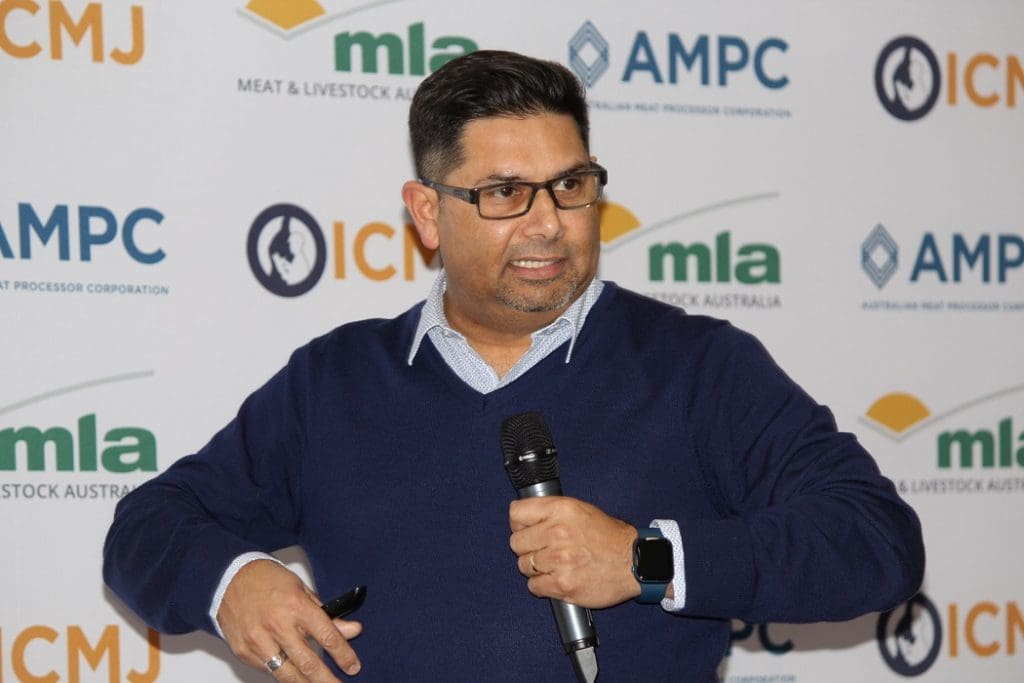
SunPork’s Dr Darryl de Souza at the ICMJ conference.
At the recent Intercollegiate Meat Judging competition conference at Wagga Wagga, SunPork executive general manager Dr Darryl de Souza said he was concerned about the level of auditing of pig producers and restaurants on swill feeding, and the monitoring of pig owners selling pigs on online sites or registering movements on PigPass.
He said swill feeding was the number one disease risk factor for the pig industry.
“So there is a huge number of peri-urban pig sellers or pig keepers
“Unfortunately they do not have to conform with a lot of the requirements a pig producer has to, and that’s no different for any other livestock industry,” he said.
“What we can do is try and protect our farms.
“So FMD in the UK came from a sandwich essentially thrown over the fence outdoors and before you knew it had spread pretty much from the south-west right through the whole country.
“That’s a real worry for us and we talk to state jurisdictions, we talk to federal jurisdictions and they go’ yeah we totally agree, that’s a risk, guess what, we don’t have the money though,” Dr de Souza said.
“So they remain to this very day and we have people that do social media and every time they come across something on a Gumtree (site) or that we try and report them.
“Australian Pork Limited, new technology, we can look at where with satellite imagery, look at where some of these peri-urbans and try and get to them,’ he said
“It’s a losing battle but you’ve got to do something.”
“The other component of it is Australia has a whole lot of feral pigs, so peri-urbans aside , your feral animal is your other big risk.
“In some ways, if FMD or ASF, African Swine Fever, and FMD is in Bali, African Swine Fever is about 1000kms from Australia in one of the islands over there, and New Guinea.”
He said most SunPork farms have double fences.
“One fence is not going to be enough to keep a feral pig out.”
“We have movement tracking in terms of people – you can’t, workers included, come into a SunPork site without doing a biosecurity declaration and that includes the lunch that you bring in, they are all shower in shower out,” he said.
“If you bring in a ham sandwich you can’t enter.
“So you’ve got to do all of those things, but some of those risks continue,”Mr de Souza said.
“At least with COVID there were no visitors.”
Dr de Souza said whether products with FMD viral particles were capable of causing the disease “remains to be seen”
“But the fact that they had DNA material in them is concerning.”



HAVE YOUR SAY